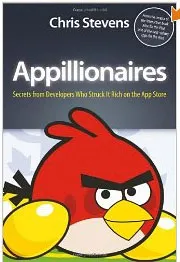[Book Review] Appillionaires: Secrets from Developers who Struck it Rich on the App Store

by Chris Stevens2011 John Wiley (Amazon)
13 chapters; 208 pages
Billions of Apple and Google apps have been downloaded to date, and developers with the right combination of original ideas, great features, solid coding, unique designs, savvy marketing and *lots* of luck can achieve fame and profit-making success. This book digs behind the scenes of five successful app companies to reveal not just the moments of glory but also the hard work, failures and resilience.
5 chapters in the book provide a history of the app economy, and 3 chapters speculate on its future. The material is not technical, and is more of business journalism mixed with a liberal dose of opinion (though more case studies could have been included). Some of the material tends to be repetitive, and there are broad sweeping generalisations about business strategy and economic forces.
Chris Stevens is a journalist, author, scriptwriter and illustrator, and has written for The Daily Telegraph and The Times in the UK. He is also the designer of apps such as 'Alice for the iPad' and ‘Alice in New York’ (by Atomic Antelope).
The mobile software industry is experiencing explosive growth, and ‘hysterical venture capitalists’ are investing huge amounts of money into the app scene, Stevens begins. As apps have gone mainstream and even entered the realm of pop culture, app developers are becoming a mix of the wealthy and the bewildered; not all, however, are destined to rock-star status.
Apple’s first attempt to build a mobile phone, the Motorola Rokr, was a failure, but led it down the path of consumer-centric design rather than a carrier-focus. “The unbundling of the iPhone’s hardware from the carriers’ control meant that Apple would soon be allowed to try its hand at selling software to cellphone users directly,” Stevens says.
In fact, the scale of the App Store’s success came as a surprise even to Apple; the micro-payment dream from the Internet Age has been realised thanks to iTunes, and the payment system used for music is used for software sales as well. Watching where Apple is headed now is to know where Microsoft, HP or Sony is heading tomorrow, according to Stevens.
It is almost strange to know that the iPhone did not technically have any apps when it first launched -- though some hackers led a ‘jail break’ and allowed users to install software on their iPhones anyway, and there were underground app stores such as Cydia.
The App Store has provoked a renaissance in gaming -- especially games that prize fun and enjoyment over graphical complexity – and spawned the rebirth of the ‘bedroom programmer,’ says Stevens. The iPhone has also completely changed the landscape of software engineering and gaming. “The mainstream gaming companies like Sony and Microsoft had spent a fortune building the videogames industry into a replica of the film business, but Apple would undo it all in a matter of months,” observes Stevens.
However, the App Store has also put Apple in a ‘tricky position as moral arbiter’ of what is acceptable in the app world. The controversy over Pulitzer-prize winning cartoonist Mark Fiore’s app NewsToons is an example of the ‘difficult responsibility Apple faces as a curator.’
While much media attention focuses on the heady gold rush in the app world, less focus is on the trials and tribulations of developers, or their strange addictions to the ‘Apple-branded heroin’ and ‘statistic fetishism’ of constantly viewing number of app downloads (an extension of viewing number of Twitter followers and Facebook friends!).
I have summarised the profiles and messages from some of the ‘appillionaires’ in Table 1 below, but readers are encouraged to dig into the actual stories of the developers’ roller-coaster adventures.
Table 1: Profiles of Successful App Developers
“The ascent of the lone programmer from the bedroom to the boardroom is another effect of the mass popularity of Apple’s products,” Stevens explains. Now large game studios are buying up indie developers, but this may not be a guarantee of future successes, he cautions – ‘boardroom drudgery’ may end up squashing indie creativity.
Questions also arise as to whether the 99 cent model for app pricing and game development is sustainable in the long term. There is also concern over unethical practices such as infighting between developers, plagiarism, lawsuits, and frivolous or vengeful reviews of apps. ‘Patent trolls’ who make no products but only buy patents and focus on litigation against indie developers risk driving some developers to app stores outside the US.
The last chapter, though too brief, raises a number of fascinating and provoking questions. What new research frontiers open up in the psychology and sociology of gamers? Will small teams of indie developers continue to stay on top of hardware evolution, or will the pace of technological sophistication eventually swing the pendulum back to the large tech companies? What new fronts will ad-supported games open up? Will the app phenomenon be only a brief bright spark of supercharged meritocracy and luck in the beginning of the 21st century?
“The next decade may, for the software industry, represent a triumph of intellectual talent over the muscle of raw capital,” Stevens concludes.
[Follow YourStory's research director Madanmohan Rao on Twitter ]


![[Book Review] Appillionaires: Secrets from Developers who Struck it Rich on the App Store](https://images.yourstory.com/cs/wordpress/2012/10/appillionaires.jpg?mode=crop&crop=faces&ar=16%3A9&format=auto&w=1920&q=75)




